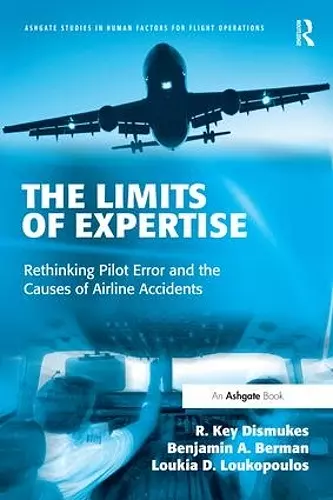The Limits of Expertise
Rethinking Pilot Error and the Causes of Airline Accidents
R Key Dismukes author Benjamin A Berman author Loukia Loukopoulos author
Format:Paperback
Publisher:Taylor & Francis Ltd
Published:12th Jan '07
Should be back in stock very soon

Why would highly skilled, well-trained pilots make errors that lead to accidents when they had safely completed many thousands of previous flights? The majority of all aviation accidents are attributed primarily to human error, but this is often misinterpreted as evidence of lack of skill, vigilance, or conscientiousness of the pilots. The Limits of Expertise is a fresh look at the causes of pilot error and aviation accidents, arguing that accidents can be understood only in the context of how the overall aviation system operates. The authors analyzed in great depth the 19 major U.S. airline accidents from 1991-2000 in which the National Transportation Safety Board (NTSB) found crew error to be a causal factor. Each accident is reviewed in a separate chapter that examines events and crew actions and explores the cognitive processes in play at each step. The approach is guided by extensive evidence from cognitive psychology that human skill and error are opposite sides of the same coin. The book examines the ways in which competing task demands, ambiguity and organizational pressures interact with cognitive processes to make all experts vulnerable to characteristic forms of error. The final chapter identifies themes cutting across the accidents, discusses the role of chance, criticizes simplistic concepts of causality of accidents, and suggests ways to reduce vulnerability to these catastrophes. The authors' complementary experience allowed a unique approach to the study: accident investigation with the NTSB, cognitive psychology research both in the lab and in the field, enormous first-hand experience of piloting, and application of aviation psychology in both civil and military operations. This combination allowed the authors to examine and explain the domain-specific aspects of aviation operations and to extend advances in basic research in cognition to complex issues of human performance in the real world. Although The Limits of Expertise is directed to aviation operations, the implications are clear for understanding the decision processes, skilled performance and errors of professionals in many domains, including medicine.
'The authors do not, however, argue that human error is just part of the price of doing business - it must still be reduced, and to be reduced, the factors associated with it must be understood as well as possible, which is the aim of their study.' AeroSafety World, May 2007 'Overall, this is an excellent and innovative text which reflects the authors' original approach to airline safety. The book is outstanding in its identification of common themes that run deeper than in previous analyses of aviation safety, and the final chapter contains clear, pragmatic guidance to the air transport and to researchers. In the final sections of the book, the authors sum up the central challenge faced by the industry in reducing vulnerability to error: pilots should be given more information, better interfaces and clearer decision-making guidance - backed up by prioritizing adherence to that guidance over commercial pressures such as on-time performance. The book will be informative for diverse readers in the air transport industry, including operational staff, researchers, safety analysts, accident investigators, designers of systems and procedures, training providers and students.' Ben Daley, Manchester Metropolitan University - Review Submitted to Amazon.com 'The Limits of Expertise challenges how we think about accidents and pilot error. From details of recent accidents, the authors argue that while pilot error is often concluded as cause, we should expect many operators similarly situated to make comparable decisions and take equivalent actions. From that perspective, individual actions and errors are not the source of accidents but a result of systemic causes. This reframing provides good news - managers and regulators can act at system levels to prevent many future accidents.' Tom Chidester, Civil Aerospace Medical Institute, USA 'This is not a Michael Crichton thriller, but those familiar with aviation will easily be able to follow the details as they are stated in fa
ISBN: 9780754649656
Dimensions: unknown
Weight: 521g
368 pages